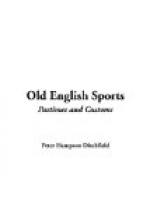Archery—Lent—“Mothering”
Sunday—Palm Sunday—
“Shere” Thursday—Watching
the Sepulchre.
Of all the sports and pastimes of old England, archery was the most renowned, and many a hard-fought victory has been gained through the skill which our English archers acquired in the use of their famous bows. “Alas, alas for Scotland when English arrows fly!” was the sad lament of many a Highland clan, and Frenchmen often learnt to their cost the force of our bowmen’s arms. The accounts of the fights of Crecy and Poitiers tell of the prowess of our archers; and the skill which they acquired by practising at the butts at home has gained many a victory. Archery was so useful in war that several royal proclamations were issued to encourage the sport, and in many parishes there were fields set apart for the men to practise. Although the sport has died out as a popular pastime, the old name, the butts, remains in many a town and village, recording the spot where our forefathers acquired their famous skill. The name is still retained in the neighbouring town of Reading, and in some old records I find that in 1549 a certain “Will’m Watlynton received xxxvi_s_. for making of the butts;” and there are several items of charges in other years for repairing and renewing the same.
[Illustration: Two archers wearing Armor.]
Edward iii. ordered “that every one strong in body, at leisure on holidays, should use in their recreation bows and arrows, and learn and exercise the art of shooting, forsaking such vain plays as throwing stones, handball, football, bandyball, or cock-fighting, which have no profit in them.” Edward IV. ordered every Englishman, of whatever rank, to have a bow his own height always ready for use, and to instruct his children in the art. In every township the butts were ordered to be set up, and the people were required to shoot “up and down” every Sunday and feast-day, under penalty of one halfpenny.
The sport began to decline in the sixteenth century, in spite of royal proclamations and occasional revivals. Henry viii. forbade the use of the cross-bow, lest it should interfere with the practice of the more ancient weapon, and many old writers lament over the decay of this famous pastime of old England, which, as Bishop Latimer stated in one of his sermons, “is a goodly art, a wholesome kind of exercise, and much commended as physic.”
The Finsbury archers had, in 1594, no less than one hundred and sixty-four targets in Finsbury Fields, set up on pillars with curious devices over them; but four years later Stow laments that “by reason of closing in of common grounds, our archers, for want of room to shoot abroad, creep into ordinary dicing-houses and bowling-alleys near home.”
The famous Robin Hood, who lived in the reign of Richard I., was the king of archers. The exploits of this renowned outlaw and his merry men form the subject of many old ballads and romances, and the old oaks in Sherwood Forest could tell the tale of many an exciting chase after the king’s deer, and of many a luckless traveller who had to pay dearly for the hospitality of Robin Hood and Little John. The ballads narrate that they could shoot an arrow a measured mile, but this is a flight of imagination which we can hardly follow!




